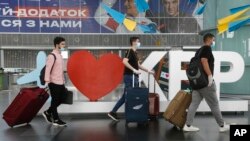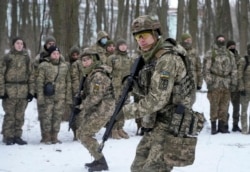European Union foreign policy chief Josep Borrell said Monday the EU is not planning to follow the United States in withdrawing family members of diplomats from Ukraine amid tensions with Russia.
Borrell spoke as he arrived for a meeting of EU foreign ministers, which U.S. Secretary of State Antony Blinken was scheduled to join virtually.
“We are not going to do the same thing because we don’t know any specific reasons. But Secretary Blinken will inform us,” Borrell told reporters.
A short time later, Britain said it was withdrawing some of its embassy staff and family members from Kyiv “in response to growing threat from Russia.”
Ukraine’s foreign ministry noted the U.S. move, but expressed displeasure.
“While we respect right of foreign nations to ensure safety & security of their diplomatic missions, we believe such a step to be a premature one & an instance of excessive caution,” spokesperson Oleg Nikolenko tweeted Monday.
The U.S. State Department on Sunday ordered the departure of eligible family members from the U.S. Embassy in Kyiv and authorized the voluntary departure of U.S. direct hire employees due to the continued threat of Russian military action against Ukraine.
The State Department also asked U.S. citizens in Ukraine to consider departing the country using commercial or other privately available transportation options.
The State Department reissued its Level 4 Travel Warning for Ukraine, saying “Do not travel to Ukraine due to the increased threats of Russian military action and COVID-19.” Previously, the travel warning had also been at Level 4, due to COVID-19.
The State Department also reissued a travel advisory Sunday night regarding travel to Russia: “Do not travel to Russia due to ongoing tension along the border with Ukraine, the potential for harassment against U.S. citizens, the embassy’s limited ability to assist U.S. citizens in Russia, COVID-19 and related entry restrictions, terrorism, harassment by Russian government security officials, and the arbitrary enforcement of local law.”
Asked about the timing of these actions on Sunday evening in Washington, a senior State Department official told reporters they come against the backdrop of reports Russia is planning significant military action against Ukraine.
The State Department official said security conditions, particularly along Ukraine’s borders, in Russia-occupied Crimea and in Russia-controlled eastern Ukraine, are unpredictable and can deteriorate with little notice.
The official said President Joe Biden has said a Russian military invasion of Ukraine could happen at any time, and if there is an invasion, the U.S. Embassy in Kyiv would have limited ability to assist Americans who might want to leave the country.
The State Department officials who briefed reporters declined to give any estimates of the number of Americans working at the embassy in Kyiv or of the number of Americans living in Ukraine.
The State Department officials said these orders are being taken as a “prudent precaution” that in no way undermines U.S. support for the government of Ukraine, and the U.S. Embassy in Kyiv will continue to operate.
The State Department also asked all U.S. citizens in Ukraine to complete an online form so that the State Department may better communicate with them, saying this is especially important for citizens who plan to remain in Ukraine.
Earlier Sunday, Blinken warned Russia that Washington knows “all of the tactics and techniques” that Moscow can deploy to undermine the Ukrainian government but will continue to engage in diplomatic talks in hopes of easing tensions in eastern Europe.
Watch related video by Arash Arabasadi:
“It is certainly possible that the diplomacy the Russians are engaged in is simply going through the motions and it won’t affect their ultimate decision about whether to invade or in some other way intervene, or not in Ukraine,” Blinken said on NBC’s “Meet the Press” show. “But we have a responsibility to see the diplomacy through for … as far and as long as we can go because it's the more responsible way to bring this to a closure.”
In a separate interview on CNN’s “State of the Union” show, Blinken ruled out the United States immediately imposing severe economic sanctions on Moscow, which it has vowed to do if Russian President Vladimir Putin invades Ukraine. Russia has massed 127,000 troops just across its border with Ukraine, a former Soviet republic.
“If they’re triggered now,” Blinken said of the possible sanctions, “you lose the deterrent factor.”
Republican Senator Joni Ernst of Iowa, following Blinken on CNN, accused the administration of President Joe Biden of a “doctrine of appeasement” in dealing with Russia over threats to Ukraine.
“The sanctions need to be imposed now,” Ernst said. “President Putin only understands strength and power. We need to have firm resolve.”
Blinken declined to comment on a British intelligence report that Russia was seeking to replace Ukraine’s government with a pro-Moscow administration. Moscow rejected the claim.
“The disinformation spread by the British Foreign Office is more evidence that it is the NATO countries, led by the Anglo-Saxons, who are escalating tensions around Ukraine,” Russian Foreign Ministry spokeswoman Maria Zakharova said on the Telegram messaging app. “We call on the British Foreign Office to stop provocative activities, stop spreading nonsense.”
Some information for this report came from The Associated Press, Agence France-Presse and Reuters.







